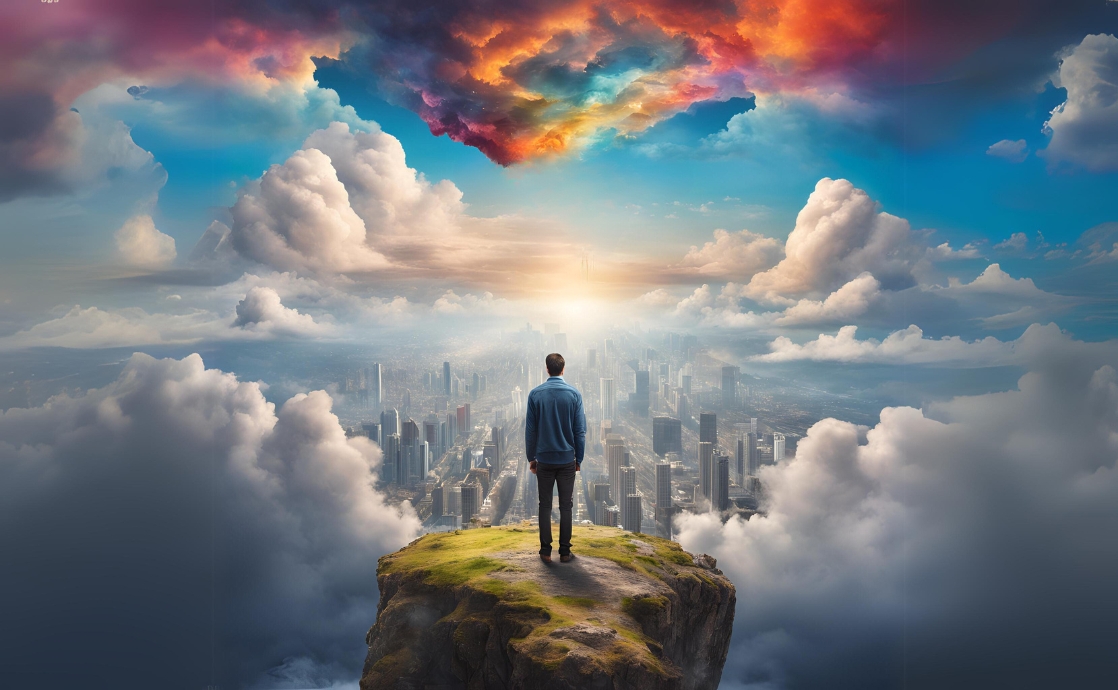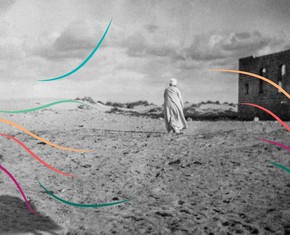The views expressed in our content reflect individual perspectives and do not represent the authoritative views of the Baha'i Faith.
We live at a propitious time in human history — in fact, the Baha’i teachings say, this is the period foretold by all the religions of the world when two manifestations of God appear, and the world unites:
All the peoples of the world are awaiting two Manifestations, Who must be contemporaneous. This is what they all have been promised. In the Torah, the Jews are promised the Lord of Hosts and the Messiah. In the Gospel, the return of Christ and Elijah is foretold. In the religion of Muhammad, there is the promise of the Mahdi and the Messiah. The same holds true of the Zoroastrians and others … Our meaning is that all have been promised the advent of two successive Manifestations. It has been prophesied that, through these twin Manifestations, the earth will become another earth; all existence will be renewed; the contingent world will be clothed with the robe of a new life; justice and righteousness will encompass the globe; hatred and enmity will disappear; whatever is the cause of division among peoples, races, and nations will be obliterated; and that which ensures unity, harmony, and concord will be promoted.
Certainly today, more than at any other time in human history, we have access to knowledge and opportunities undreamt of in times past. We have the ability to realize these noble visions of justice, peace, and human unity. Humanity has advanced toward eradicating its divisions and disputes — but major challenges still exist, and we still need to overcome the forces of hatred and hostility in our struggle to realize all that this present age offers us and to live into the great promises and prophecies of past religions.
RELATED: Science, Religion, and Overcoming Superstitions
Those of us who live in materially-advanced countries face some unique challenges. Our cultures often take pride in their technological and economic accomplishments and share a narrative of superiority over less materially developed nations and people. It is easy to be beguiled by this narrative, as many in the world are; however, upon closer investigation, we can see the bankruptcy of this model for humanity as a whole.
Our materially advanced societies in the so-called “first world” now suffer from a significant moral, spiritual, and social decline, masked by our material prosperity and well-being. The despair and hopelessness evident in these cultures bear witness to this problem, as do the vain, fruitless attempts to address it through opiates such as consumerism and entertainment.
For humanity to realize its true potential for unity and peace, a new narrative is necessary, one that embraces all of humankind and the spiritual as well as the material aspects of civilization.
This new narrative — one world united to advance the best interests of each and all of its inhabitants — reexamines the role of spirituality and religion in human affairs.
When we look back into the past, at how organized religions have contributed to the advancement of civilizations, we can come away with conflicting opinions. On the one hand, religions have been the cause of great contributions to civilization; and on the other, they have sometimes fomented hatred, wars, and superstition. We can see that when religion becomes corrupted, it can lead to great destruction — just as it can lead to great development when its pure spirit prevails.
However, we live in a time when religion is increasingly being discredited and discounted, and materialistic conceptions of reality are gaining growing precedence. This is not without merit, as some religions cling to superstitious, outdated and unreasonable ideas, and practices that conflict with science and reason. The followers of those traditions sometimes hypocritically judge others and fail to live up to even their faith’s most basic teachings. As a result, many traditional religions have lost their hold on the hearts and minds of the people and are no longer a potent source of moral and social good.
This void is being filled by materialistic conceptions and values that have become like a religion. This new religion, focused on the physical world and the gratification of the self, exalts the gratification of desires and needs, elevating consumerism as the new worship. The virtues of this new materialistic belief system were the vices of the older faiths: pride, greed, lust, and selfishness. Rather than this being the path to the advancement of humanity, it is instead the highway to the destruction of the fabric of civilization and the social order. Rather than cultivating human character and virtues, it uproots and destroys them.
When practiced purely, religion has the ability to acquaint us with our higher selves and illuminate reality. In addition, it can impel us, as nothing else has been able to do, to strive to be better people.
Baha’u’llah, the prophet and founder of the latest of the global religions, the Baha’i Faith, wrote:
… is not the object of every Revelation to effect a transformation in the whole character of mankind, a transformation that shall manifest itself, both outwardly and inwardly, that shall affect both its inner life and external conditions? For if the character of mankind be not changed, the futility of God’s universal Manifestation would be apparent.
The world desperately needs this inner and outer transformation at this stage in its evolution. These teachings — if we can succeed in implementing them — will create a new heaven and a new earth.
Baha’u’llah revealed a thorough, comprehensive set of spiritual and moral teachings needed to transform the inner and outer character of humankind. His teachings provide the framework for the new world foretold in all the holy books. His laws and teachings provide the way for us to achieve our potential and happiness individually and collectively, and the means for the elevation and advancement of our world. Baha’u’llah wrote:
Were men to observe that which We have sent down unto them from the Heaven of Revelation, they would, of a certainty, attain unto perfect liberty. Happy is the man that hath apprehended the Purpose of God in whatever He hath revealed from the Heaven of His Will, that pervadeth all created things.
In this series of essays, let’s look at some of the new ideas and teachings Baha’u’llah brought to reconstruct and unify the world, and consider how they differ from current thought, standards, and practices.
The first and most central Baha’i principle is the oneness of humanity. This deceptively simple new teaching for humanity can eliminate all racial, gender, economic, class, national, sectarian and other prejudices — in other words, any ideology that allows one group of people to consider themselves superior to others and deserving of preferential treatment. This primary Baha’i principle, when implemented in all parts of the planet, creates the essential conditions for world harmony and peace.
Another primary Baha’i principle states that there is one Creator, often referred to as God, who has progressively revealed to humankind through a succession of messengers the teachings we need to prosper and advance.
Like teachers in a school, these Divine messengers and educators of humanity provide instruction according to our evolving capacity, revealing more knowledge as we are ready. They come at different stages of human development to guide us toward fulfilling all the potential forces with which they have been endowed. These prophets reiterate and expand on the essential spiritual and moral teachings found in every religion and bring new social teachings appropriate for that age.
Baha’u’llah’s spiritual, social, and moral teachings have the capacity to transform the world into a place of peace and tranquility, where the needs of all can be addressed, and humanity can progress in prosperity and happiness.
How do we begin this transformational process? By changing our own lives. By raising our consciousness and behavior above those around us, we become catalysts for change. If we ourselves do not change, how can we expect others to do so? We are primarily responsible for improving ourselves first and then, as we are able, to help others.
This is a challenge and not an easy one. To raise ourselves above the standards we have become accustomed to is difficult, but the alternative is to remain in our present condition.
RELATED: Science and Religion: Can They Work Together?
So it is possible to find increased joy, energy, and contentment when we free ourselves from the constraining views and harmful behaviors that characterize much of modern society. The Baha’i teachings give us an ability to find an inner assurance and strength that will protect us from the many changes and chances we experience in this world. Once we embark on this spiritual path, the superficial thoughts and feelings that had dominated our lives will give way to ever-deepening knowledge and ever-expanding love, first for ourselves and then for the world.
The good news: we do not need to rely on anyone else. The capacity to change lies in our own hands. We do this by gradually altering the way we think, feel, and behave — by consciously choosing loftiness over lowliness. It doesn’t matter where we start, but until our thinking, feeling, and behaving all change, the transformation will not be fully effective. It requires effort to see things differently, to feel differently about something and to behave differently. It also takes time, but with daily effort, progress will become apparent to us and those around us.
This journey represents a lifelong process of getting healthier and happier as we mature. We will make mistakes and become disheartened from time to time. That is part of the process and should not deter us. We are not perfect and never will be, but we can improve our lives step by step, picking ourselves up when we fall down. We can do this, and we can start today.
















Comments
Sign in or create an account
Continue with Googleor